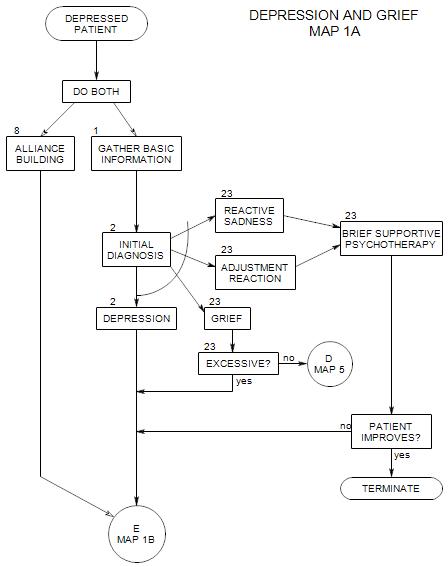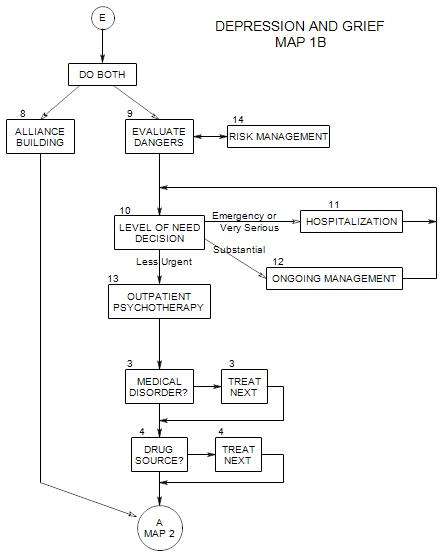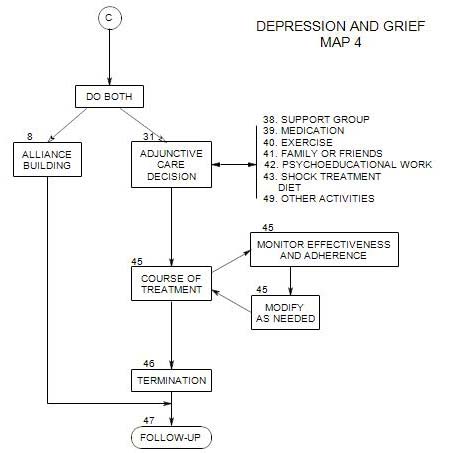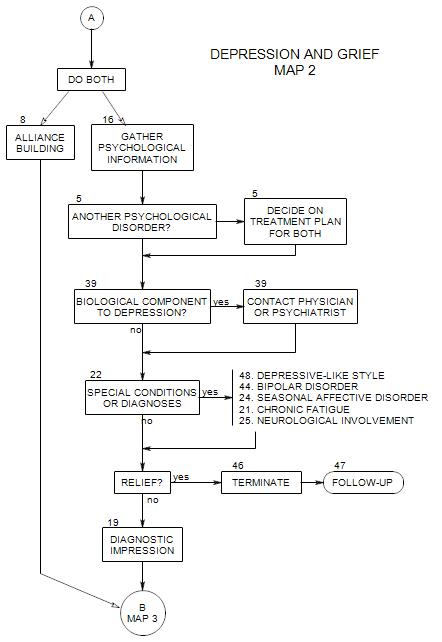
SECTIONS: 5 | 8 | 16 | 19 | 21 | 22 | 24 | 25 | 39 | 44 | 46 | 47 | 48
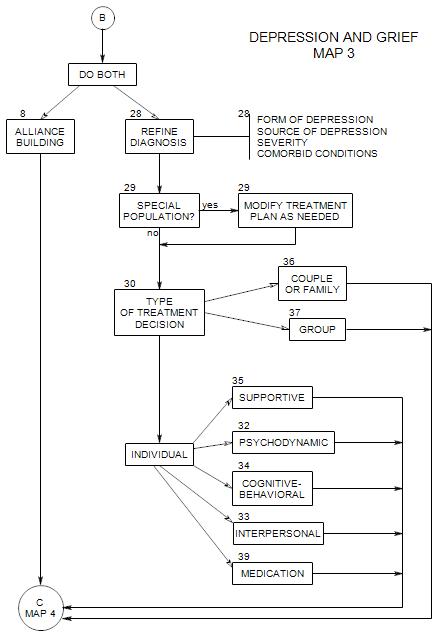
SECTIONS: 8 | 28 | 29 | 30 | 32 | 33 | 34 | 35 | 36 | 37 | 39
7. ADJUNCTIVE CARE FOR GRIEF
-
Follows Section 6: Treatment of Grief and Section 23: Treatment of Reactive Sadness and Adjustment Disorders
When a person is reacting to a strong external stimulus, as in grief or an adjustment reaction, attempts to get him/her to look inward may be ineffective. In fact they may seem to the patient to trivialize and pathologize a normal process, almost like blaming the victim.
And in fact, asking a patient to look inward may be less important than helping him/her examine the external circumstances carefully, appreciate his/her own reactions, and find help in other people and other outside resources .
Adjunctive work can be focused on specific aspects of the patient’s grief – aspects not easily handled directly in psychotherapy.
7a. Kind of Loss
The nature of the help needed depends on the significance and function of the person’s loss.
- Loss of a caretaker.
- Loss of a job or relationship function, such as taking care of someone else.
- Loss of a body part or function.
7b. Other Resources
The grieving person may need to shift the balance in his/her life, at least temporarily, between work and play, activity and contemplation, to allow for a manageable processing of the loss and a readjustment to changes in life’s priorities. Loss of work can lead to a search for new work. Loss of a function can lead to a need forphysical therapy, job re-training, or another reaction. Loss of a loved one can be especially traumatic and difficult, depending on the patient’s relationship to the loved one prior to the loss.
Example: A couple’s first child died three days after birth. The couple divorced, the mother moved away, and twenty years later the father was still visiting his only daughter’s grave every week.
BIBLIOTHERAPY
Some people benefit from reading about losses similar to theirs.
BEREAVEMENT GROUPS
Sometimes psychotherapy alone is not sufficient to deal with the full impact of the person’s loss, and the person’s participation in a focused group is helpful. The choice of group depends on what is available locally, the nature and source of the patient’s grief, whether the patient needs to take action or find support, etc.
Bereavement groups can often be found through organizations such as…
- The American Cancer Society
- Cancer Care.
- The American Heart Association
- The Epilepsy Association
- the Diabetes Association
- County Mental Health Associations
- Hospice
OTHER GROUPS
Some patients can benefit from non-bereavement groups, through social organizations, religious affiliations, clubs, political activities or charity work. Groups can offer involvement with other people, a focus on a shared external problem, and an opportunity to use social and physical talents.
GROUP PSYCHOTHERAPY
Although it can be a primary form of treatment for many disorders, group therapy has many benefits, including social interaction, focus on others and their issues, possibilities for examining different aspects of the patient’s life, and so on.
ACTIVITIES
Involvement in other activities can also offer relief from an excessive focus on the person’s loss, spreading out the grieving process and making it more manageable. Possibilities include…
- Increased attention to work, taking on addition responsibilities, working longer hours, finding a job or another job, etc.
- Re-focus on hobbies, sports, or other activities that have been important in the past. Looking for new hobbies or activities that could be interesting or engrossing.
With some patients, however, the suggestion of greater involvement in activities may be seen as insensitive and they will react with indignation. The more a person is out of balance, the more tempted we are to suggest distractions, and the more likely the person is to reject them.
At the other extreme, the frantic pursuit of other activities can become defensive, an alternative to dealing directly with the grief. In times of great change, getting a balance can be difficult.
FAMILY AND FRIENDS
You can try to enlist family or friendship support, if others are capable of it. However, others may be stressed or grieving and unable to help; or they may also have difficulty handling the patient’s reactions.
7c. Making the Choice
Adjunctive care can be targeted to the patient’s major symptoms, to provide relief in a stressful time. These can include the following.
If the patient is alone, isolated and lonely, you may encourage him/her to consider…
- group psychotherapy [ Section 37 ]
- a support group [ Section 38 ]
- expanding on involvement in work, hobbies, or other activities [ Section 49 ], or
- social or religions groups [ Section 38 ].
If the person feels that others don’t understand or support him/her, consider
- information [ Section 42 ]
- a self-help group [ Section 38 ]
- group therapy [ Section 37 ] or
- family therapy [ Section 36 ]
If the person needs help with life changes, consider
- vocational counseling
- information [ Section 42 ] or
- individual psychotherapy [ Section 32, Section 33, Section 34 or Section 35 ]
If the person is having religious conflicts, [possibly about such issues as the meaning of life, the benevolence of God, the helpfulness of his/her religious organization, the things he/she was taught about right and wrong] then individual psychotherapy [ Section 32, Section 33, Section 34 or Section 35 ] may be helpful.
If there are serious depressive symptoms, then further evaluation may be in order…
- to reconsider psychotherapy.
- to medicate for depression.
